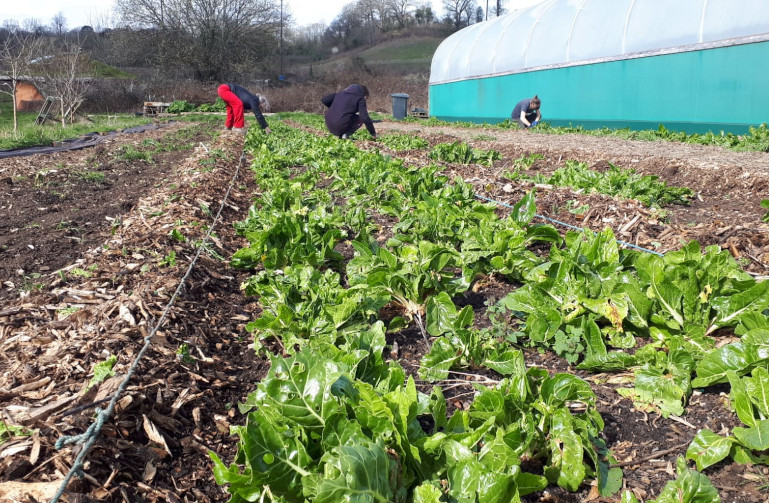On Thursday 4th January, the Landworkers Alliance (LWA) launched its brand new report “Horticulture Across Four Nations” at a panel discussion at the Oxford Real Farming Conference (ORFC).
The report makes the case for an upscaling of domestic vegetable production, and for 20% of the £2.7 billion the UK currently spends on vegetable imports to be spent instead on sourcing fresh, agroecological veg from local UK producers.
A panel of growers and organic vegetable retailers from Wales, Scotland, Northern Ireland and England, who all feature in the report joined the launch at a panel to talk about the benefits of localised production and supply chains, and call on their respective governments to provide more support for the agroecological horticulture sector.
It is widely understood that we need to produce more vegetables in the UK to improve both public health and the resilience of our domestic food supply. At present we import 43% of our vegetables, while 77% of adults are eating less vegetables than the recommended amount.
To meet the need for UK vegetables, the Landworkers’ Alliance has a vision for upscaling the number of agroecological market gardens in the UK, and for 20% of the £2.7 billion we currently spend on imports to be spent instead on UK-grown fresh produce, distributed to households by farmer- focused routes to market and to primary school pupils through school meals.
Organic and agroecological market gardens have the potential to contribute significantly to rural regeneration, local economies and community resilience while bringing multiple environmental, social, employment, financial and productivity benefits.
As this new report shows, not only would re-orienting our vegetable supply away from imports and towards home-grown produce provide more households with a fresh and dependable source of vegetables, but it would also generate a wealth of benefits in terms of public health, environment, and social benefits.
Furthermore, research suggests that for every £1 spent locally, £3.70’s worth of benefits are generated locally. If the UK was to spend 20% of the money it currently spends on imports on domestic production instead, we could potentially see around £2 billion worth of benefits generated for local communities.
Yet, although active and ambitious, the market garden and agroecological horticulture sector is small and woefully lacking in adequate support. The Landworkers’ Alliance’s vision of expanding the sector is limited by lack of access to land, investment capital for equipment and infrastructure, inadequate training opportunities and planning constraints.
Rebecca Laughton, Horticulture Campaign Coordinator at the LWA, and author of the report, says:
“The time has come for bold and decisive action from all four devolved Governments, to help our horticulture sector thrive. The environment, public health, local economies and communities all stand to win if policy makers work with us to achieve this vision”.
The report showcases inspiring examples that already exist throughout the UK of highly productive and sustainable market gardens, some of which are collaborating to supply urban or rural populations.
For example, Growing Communities has evolved over 25 years to supply Hackney households with fresh produce, which is sourced mainly from their own peri-urban farm and a mixture of farms within a fifty mile radius of London.
Knockfarrel Produce, a croft in the Scottish Highlands, is generating over £18,000 per hectare as a market garden as opposed to the £320 per hectare it was previously generating as low quality sheep grazing pasture, while supplying 250 households.
Jo Hunt, owner of Knockfarrel Produce, says:
“Why does the government give big farmers 47p for every £1 of beef and lamb they produce, but only 2p to small producers for every £1 of fruit and veg they grow? It makes no sense, when we want a healthier diet that contributes less to climate chaos.
To bridge the gap between what people want to eat, and the ability of local farms to supply them, we need to rethink how government supports healthy food producers and reallocate funds to the key tasks of training more growers, giving them a living wage, and offering access to good food at fair prices in every community. This report sets out the policy levers that need pulled to make it happen”
In 2022, the Cardiff Courgette Pilot supplied 29 primary schools in Cardiff with locally grown, agroecological courgettes for a three week “Food and Fun” summer holiday activity camp.
The initiative now supplies 10 tonnes of a variety of different vegetables into school meals across three counties in South Wales.
Dr. Amber Wheeler, who’s PhD looked at what needs to happen for the UK to meet five a day, says:
“Market gardens supplying into primary schools is something that is entirely possible and there are examples of where it is working well such as the Welsh Veg into Schools pilot.
The evidence is clear that we need to increase production and consumption of fruit and veg across the UK. Considerable market garden expansion has a part to play in that and this report lays out the potential and what needs to happen to make it a reality.”
The Landworkers’ Alliance is a grassroots union of farmers, foresters and land-based workers in the UK. It is part of a global movement representing 200 million small-scale farmers under the umbrella group La Via Campesina. More information about the Landworkers’ Alliance (LWA) can be found here: https://landworkersalliance.org.uk/
Landworkers’ Alliance has almost 2,500 members across the UK – around 50% of whom work in horticulture.
The views expressed in our blog are those of the author and not necessarily lowimpact.org’s





